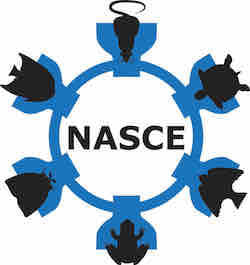Mission
The North American Society for Comparative Endocrinology (NASCE; Societé Nord-Americaine d’Endocrinologie Comparée (SNAEC); Sociedad Norteamericana de Endocrinologìa Comparada (SNAEC)) is an interdisciplinary scientific organization dedicated to the study of comparative, evolutionary, ecological and model systems endocrinology. Endocrinology is the study of hormones and their actions. This field is rooted in the comparative study of hormones in diverse species, which has provided the foundation for the modern fields of evolutionary, environmental and biomedical endocrinology. The NASCE is distinguished from other professional societies in North America in that it serves scientists who, in addition to conducting research on biomedically important species like rodents and nonhuman primates, as part of their profession study diverse species including non-mammalian animal model systems.
The biennial meetings of the NASCE and its journal, General and Comparative Endocrinology provide essential forums for the communication and exchange of discoveries and ideas in the field of comparative endocrinology. Comparative endocrinologists work across disciplinary boundaries, from molecular to ecological. Members of the NASCE conduct basic research in diverse areas of the life sciences, such as the development of alternative animal model systems for discovery of novel hormones and hormone-signaling pathways; the discovery of new pharmaceuticals to treat human disease; the design of hormonally-based strategies for pest control; the development of sensitive, representative and high-throughput endocrine-screening assays for endocrine disrupting chemicals (EDCs); the analysis of the impact of global climatic change on animal populations; the elucidation of pathways and mechanisms of evolution through the study of endocrine genes and structures; and the development of improved strategies for the production of animal protein to feed the world’s growing human population.
This is not intended to be a comprehensive list, or to limit research in this field, but rather to serve as a stimulus for further thought and discussion. Critical to these efforts is the recruitment and broad training of young scientists, continued and expanded support for their research, and the coordination of efforts among scientists in diverse areas of the life sciences who have a common interest in chemical mediation.
The biennial meetings of the NASCE and its journal, General and Comparative Endocrinology provide essential forums for the communication and exchange of discoveries and ideas in the field of comparative endocrinology. Comparative endocrinologists work across disciplinary boundaries, from molecular to ecological. Members of the NASCE conduct basic research in diverse areas of the life sciences, such as the development of alternative animal model systems for discovery of novel hormones and hormone-signaling pathways; the discovery of new pharmaceuticals to treat human disease; the design of hormonally-based strategies for pest control; the development of sensitive, representative and high-throughput endocrine-screening assays for endocrine disrupting chemicals (EDCs); the analysis of the impact of global climatic change on animal populations; the elucidation of pathways and mechanisms of evolution through the study of endocrine genes and structures; and the development of improved strategies for the production of animal protein to feed the world’s growing human population.
This is not intended to be a comprehensive list, or to limit research in this field, but rather to serve as a stimulus for further thought and discussion. Critical to these efforts is the recruitment and broad training of young scientists, continued and expanded support for their research, and the coordination of efforts among scientists in diverse areas of the life sciences who have a common interest in chemical mediation.
